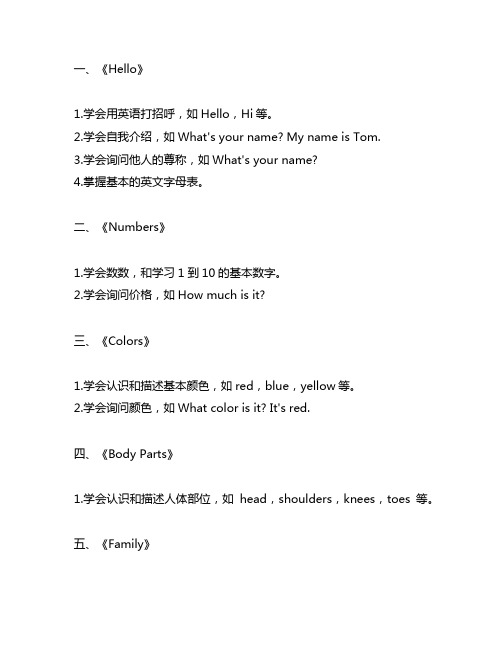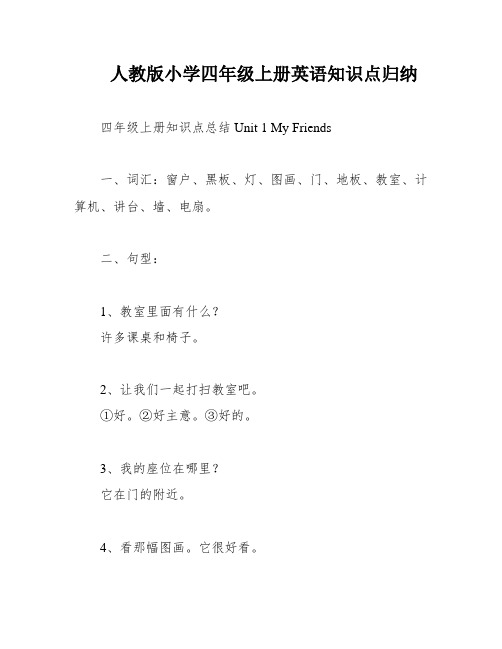人教新起点四年级英语上知识总结
- 格式:docx
- 大小:21.11 KB
- 文档页数:5

四年级英语上册(新起点)Unit 5 Safety必备知识点四年级英语上册(新起点)Unit 5 Safety的必备知识点主要包括词汇、句型、语音及安全规则等方面,以下是对这些知识点的详细归纳:一、词汇1. 与安全相关的词汇:climb on the window ledge(爬窗台)dangerous(危险的)play with fire(玩火)be careful(当心)run down the stairs(跑下楼梯)sidewalk(人行道)wait for(等待)safe(安全的)stop(停)street(街道)safety rule(安全规则)2. 其他词汇:green(绿色的)red(红色的)play football(踢足球)(虽然此词汇与安全主题不直接相关,但可能在本单元中出现)二、句型1. 描述做某事是危险的句型:Don't run down the stairs. It's dangerous!(不要跑下楼梯,那是危险的!)Climbing on the window ledge is dangerous.(爬窗台是危险的)2. 描述做某事是安全的句型:Please use the sidewalk. It's safe.(请使用人行道,那是安全的)Waiting for the green light is safe.(等待绿灯是安全的)3. 祈使句:Be careful!(当心!)Stop!(停!)Wait for me!(等等我!)三、语音1. 字母组合“ur”的发音:在本单元中,学生可以学习并练习字母组合“ur”在单词中的发音,如hurt, nurse, purse, purple, turtle, burn等。
四、安全规则1. 学校安全规则:不要爬窗台或阳台,以免发生坠落事故。
不要玩火或接触易燃易爆物品,以免引发火灾。
在楼梯上不要奔跑或打闹,以免摔倒或碰撞。

一、《Hello》1.学会用英语打招呼,如Hello,Hi等。
2.学会自我介绍,如What's your name? My name is Tom.3.学会询问他人的尊称,如What's your name?4.掌握基本的英文字母表。
二、《Numbers》1.学会数数,和学习1到10的基本数字。
2.学会询问价格,如How much is it?三、《Colors》1.学会认识和描述基本颜色,如red,blue,yellow等。
2.学会询问颜色,如What color is it? It's red.四、《Body Parts》1.学会认识和描述人体部位,如head,shoulders,knees,toes等。
五、《Family》1.学会认识家庭成员,如father,mother,brother,sister等。
2.学会询问他人的家庭成员,如How many people are there in your family?六、《Animals》1.学会认识和描述一些常见的动物,如cat,dog,bird,fish等。
2.学会询问他人是否喜欢动物,如Do you like animals?七、《Fruit》1.学会认识和描述一些水果,如apple,banana,orange,grape等。
2.学会询问他人喜欢的水果,如What fruit do you like?八、《Snacks》1.学会认识和描述一些零食,如chips,cookies,candy,chocolate 等。
2.学会询问他人喜欢的零食,如What snacks do you like?九、《Clothes》1.学会认识和描述一些常见的服装,如T-shirt,pants,shoes,hat等。
2.学会询问他人穿着的衣服,如What are you wearing today?十、《D本人ly Routines》1.学会描述日常的生活习惯,如get up,go to school,have lunch,do homework等。


人教版小学四年级英语上册知识点总结和复习要点一、词汇积累与运用1基础词汇熟练掌握课本中涉及的日常用品、交通工具、职业、学校生活等基础词汇。
注意词汇的正确发音、拼写及词义。
例子:日常用品:pen(钢笔)、pencil(铅笔)、book(书)、eraser(橡皮擦)。
交通工具:bike(自行车)、bus(公交车)、car(小汽车)、plane(飞机)。
2短语与固定搭配学习并掌握课本中出现的常用短语和固定搭配,如“open the door”(开门)、“put on your shoes”(穿上鞋子)等。
能够在具体语境中正确运用这些短语和固定搭配。
例子:固定搭配:look at(看)、have a try(试一试)、come on (加油)。
二、句型学习与掌握1陈述句与疑问句熟练掌握陈述句和疑问句的基本结构,能够正确运用主语、谓语和宾语。
学会使用疑问句询问信息,如“What’s this?”(这是什么?)和“Where is your book?”(你的书在哪里?)。
例子:陈述句:I have a new pencil box.(我有一个新的铅笔盒。
)疑问句:Do you like playing football?(你喜欢踢足球吗?)2特殊疑问句学习并掌握“What color is it?”(它是什么颜色的?)、“How old are you?”(你多大了?)等特殊疑问句及其回答方式。
能够根据问题提供正确的信息。
例子:特殊疑问句:What do you usually do on weekends?(你周末通常做什么?)回答:I usually go to the park with my family.(我通常和家人去公园。
)三、语音与语调规则1元音与辅音发音复习并巩固元音和辅音的发音规则,注意发音的准确性和清晰度。
练习发音相近或容易混淆的词汇,提高发音敏感度。
发音练习:正确区分“thin”(瘦的)和“thing”(事情)的发音。

人教版小学四年级上册英语知识点归纳四年级上册知识点总结 Unit 1 My Friends一、词汇:窗户、黑板、灯、图画、门、地板、教室、计算机、讲台、墙、电扇。
二、句型:1、教室里面有什么?许多课桌和椅子。
2、让我们一起打扫教室吧。
①好。
②好主意。
③好的。
3、我的座位在哪里?它在门的附近。
4、看那幅图画。
它很好看。
5、我们有一个室。
让我们一起去看看吧。
它很大,墙是白色的。
6、让我来擦窗户。
做得好!三、语法:1、Where 引导的特殊疑问句:看到 where 就要想到地点方位词,例如:on。
in。
under。
near。
behind 等。
2、Let’s = Let us 让我们Let me 让我特殊疑问句例句:1、你叫什么名字?2、你爸爸是干什么的?3、你的盒子里是什么?4、北京的天气怎么样?5、现在几点了?6、这双鞋子怎么样?7、你呢?1.I'm XXX.2.How many cups of milk do you need。
Three.3.Excuse me。
where is the nearest bookshop?4.What is your father's job?5.How are you。
- Fine。
thanks.6.How much is it。
Five yuan.Unit 2: My SchoolbagVocabulary: Chinese book。
English book。
maths book。
schoolbag。
storybook。
XXX。
candy。
XXX.XXX:1.How many books do you have。
- I have six。
/ Six.2.I have a new schoolbag。
- What colour is it。
- It's black and white.3.May I have a look。
- Sure。

四年级英语上册(新起点)Unit 1 Sports and Games必备知识点四年级英语上册 (新起点)Unit 1 Sports and Games的必备知识点主要包括词汇、句型、语法以及相关的文化拓展内容。
以下是对这些知识点的详细归纳:一、词汇1. 运动类词汇:running:跑步basketball:篮球roller skating:滑旱冰jumping rope:跳绳ping-pong:乒乓球swim:游泳2. 其他相关词汇:interesting:有趣的often:经常be good at:擅长late:晚friend:朋友father:父亲get up:起床二、句型1. 询问对方是否喜欢某项运动的句型:Do you like running? 你喜欢跑步吗?Yes, I do. 是的,我喜欢。
No, I don't. 不,我不喜欢。
2. 询问对方是否经常做某事的句型:Do you often play basketball? 你经常打篮球吗?Yes, I do. 是的,我经常打。
No, I don't. 不,我不经常打。
3. 询问对方是否擅长某项运动的句型:Are you good at swimming? 你擅长游泳吗?Yes, I am. 是的,我擅长。
No, I'm not. 不,我不擅长。
4. 表达个人喜好和能力的句型:I like playing basketball. 我喜欢打篮球。
I am good at jumping rope. 我擅长跳绳。
三、语法1. 一般现在时:表示经常发生的动作或习惯,常用“often”、“always”、“usually”等词修饰。
例如:I often go roller skating. 我经常去滑旱冰。
2. be good at的用法:后面接名词或动名词 (即动词的-ing形式),表示 “擅长某事”。
例如:He is good at playing basketball. 他擅长打篮球。
人教版新起点四年级上册英语知识点一、词汇。
1. 学校相关。
- classroom(教室)、library(图书馆)、playground(操场)、office(办公室)。
- teacher(教师)、student(学生)、principal(校长)。
2. 学科类。
- Chinese(语文)、English(英语)、math(数学)、science(科学)、art (美术)、music(音乐)、PE(体育)。
3. 日常用品。
- book(书)、pencil(铅笔)、pen(钢笔)、ruler(尺子)、eraser(橡皮)、notebook(笔记本)。
4. 家庭成员。
- father(父亲)、mother(母亲)、brother(兄弟)、sister(姐妹)、grandfather(祖父/外祖父)、grandmother(祖母/外祖母)。
5. 数字。
- one - ten(1 - 10)的英语单词。
- 重点掌握基数词的拼写和读音,如:three、seven(7)等。
6. 方位词。
- in(在……里面)、on(在……上面)、under(在……下面)、beside (在……旁边)、behind(在……后面)、in front of(在……前面)。
7. 描述人物特征的形容词。
- tall(高的)、short(矮的)、strong(强壮的)、thin(瘦的)、big(大的)、small(小的)、long(长的)、short(短的,矮的)。
8. 颜色类。
- red(红色)、blue(蓝色)、green(绿色)、yellow(黄色)、black(黑色)、white(白色)等。
9. 动物类。
- cat(猫)、dog(狗)、bird(鸟)、fish(鱼)、monkey(猴子)、panda (熊猫)等。
10. 衣物类。
- shirt(衬衫)、skirt(裙子)、pants(裤子)、dress(连衣裙)、jacket (夹克衫)、sweater(毛衣)。
1.party 聚会 准备好邀请卡 蜡笔 剪刀钢笔胶水纸画剪,切粘贴写,写字说步骤可以:first 首先,第一next 其次then 然后,于是finally 最后with 用……practice 练习2.重点短语1)get your paper ready 准备好你的纸2)have a party 举行聚会3)Teachers’ Day 教师节4)for the party 为了聚会5)make an invitation 制作邀请卡6)draw with crayons 用蜡笔画7)cut with scissors 用剪刀剪8)stick with glue 用胶水粘9)write with pen 用钢笔写10)clean the classroom 清洁教室11)practice some songs and dances 练习一些歌曲和舞蹈12)Children’s Day 儿童节13)on this day 在这天14)at home 在家里15)talk and laugh 说说笑笑16)in the courtyard 在院子里17)Tian’anmen Square 天安门广场18)national flag 国旗19)go around 四处走20)Christmas tree 圣诞树3.句型1).一般将来时结构:陈述句:主语+be going to +动词原形+其它“将要做……”eg: I’m going to make an invitation.我将要制作邀请卡。
We are going to practice some songs and dances.我们将要练习一些歌曲和舞蹈。
否定句:主语+be + not + going to +动词原形+其它e g: I’m not going to draw a picture.我将不去画一张画。
一般疑问句:be+ 主语+ 动词原形+其它eg: Are you going to play game?你将要玩游戏吗?肯定回答:Yes, I am.否定回答:No, I’m not.特殊疑问句:疑问词+一般疑问句(疑问内容)eg: What are you going to do?你将要做什么?2).Do you have…?“你有…?”eg: Do you have scissors?你有剪刀吗?肯定回答:Yes, I do. 是的,我有。
人教版小学四年级上册英语知识点归纳总
结
一、词汇:
1. 基本日常用语:Hello,Good morning!等
2. 各学科名词:math,science,art等
3. 数词:one,two,three等
4. 季节、天气词汇:spring,summer,sunny等
5. 动物和食物词汇:cat,dog,apple,banana等
二、语法:
1. 句型构成:主语 + 谓语 + 宾语
2. 动词的时态:一般现在时,一般过去时
3. 疑问句的构成:疑问词 + 助动词/情态动词 + 主语 + 谓语
三、听力:
1. 听懂简单的日常用语和指令
2. 听懂简短对话中的关键词和句子
3. 根据听到的内容回答简单问题
四、口语:
1. 能用简短的句子进行日常交流
2. 能用简单的词汇和句子进行自我介绍
3. 能用简单的语句表达自己的感受和喜好
五、阅读:
1. 能读懂简单的单词、短句和段落
2. 能根据图片或简短句子回答问题
3. 能阅读简单的故事或对话并理解基本内容
六、写作:
1. 能用简单的语句写出自己的名字、年龄和喜好
2. 能用简单的句子描述描绘短文中的内容
3. 能写出简短对话或简单的日记、便条等
以上是人教版小学四年级上册英语的知识点归纳总结,希望对您有所帮助。
人教版新起点四年级上册英语知识点总结2023一、单词1.动物类单词:cat猫,dog狗,pig猪,cow牛,sheep羊,horse马,fish鱼,bird鸟,monkey猴子。
2.颜色类单词:red红,blue蓝,green绿,yellow黄,white白。
3.数字类单词:one一,two二,three三,four四,five五,six六,seven七,eight八,nine九,ten十。
4.方向类单词:left左,right右,up上,down下。
5.水果类单词:apple苹果,banana香蕉,orange橙子,pear梨子,peach桃子。
二、语法1.现在进行时:表示正在进行的动作或存在的状态。
结构为“be动词+动词ing”。
常用的be动词有am、is、are,动词ing形式包括有动词原形加上-ing。
例如:I am playing football.我正在踢足球。
2.祈使句:表示请求、命令或建议的句子。
祈使句的开头通常是“Please”,结尾通常用感叹号。
例如:Please stand up!请起立!3.疑问句:提出问题的句子。
疑问句的结尾通常用问号。
例如:What time isit?现在几点了?4.可数名词和不可数名词:可数名词是指可以计数的名词,通常有单数和复数两种形式;不可数名词是指无法计数的名词,没有单数和复数的区别。
例如:one apple(可数),some water(不可数)。
5.代词:代替名词的词叫做代词。
人称代词包括I(我)、you(你)、he(他)、she(她)、it(它)等;物主代词包括my、your、his、her等。
例如:My name is Tom.我的名字是汤姆。
6.介词:介词通常用于名词或代词前,表示名词或代词与其它词之间的关系。
常用的介词有in、on、at、behind等。
例如:The book is on the table.书在桌子上。
7.连词:连词用于连接两个或两个以上的词、短语或句子。
人教新起点四年级英语上知识总结Unit1 Sports and Games一、Vocabularybasketball, football, volleyball, ping-pong, baseball, soccer, tennis, badminton, hockey, table tennis, running, swimming, roller-skating, jogging, rowing, diving, jumping rope, fencing, shooting, weight-lifting, cycling, interesting, be good at, also, often二、Sentences1. Do you often……? Yes, I do. No, I don’t.Eg: Do you often play basketball? Yes, I do.Do you often go roller-skating? No, I don’t.2. Do you like…..? Yes, I do. No, I don’t.Eg: Do you like jumping rope? Yes, I do.Do you like tennis? No, I don’t.3. Are you good at …..? Yes, I am. No, I’m not.Eg: Are you good at playing football? Yes, I am.Do you often play basketball? Yes, I do. Are you good at it? Yes, I am.4. What about you? 你呢?I also like ……我也喜欢…..Eg: --Do you like running?--Yes, I do. I also like swimming. What about you?--I like badminton. It’s interesting.5. What sport do you like? I like ……Eg: What sports do you like? I like volleyball.What sports do you like? I like playing tennis.Unit2 On the weekend一、Vocabularyvisit one’s grandparents, climb a hill, go to the cinema, pick fruit, go to a drawing clubgo fishing, play computer games, fun, on the weekend, often, always, Monday, Tuesday, Wednesday, Thursday, Friday, Saturday, Sunday,二、Sentences1. What do you often do on the weekend? I often……Eg: What do you often do on the weekend? I often visit my grandparents. What do you often do on the weekend? I often go to a drawing club on the weekend.2. Do you often……? Yes, I do. No, I don’t.Eg: Do you often go to the cinema on the weekend? Yes, I do.Do you often play computer games on the weekend? No, I don’t.Unit3 Transportation一、Vocabularyusually, by bus, by train, by boat, by ship, by car, by subway, by bike, by plane, by motorbike, by jeep, by taxi, by school bus, on foot, how,二、Sentences1. How do you usually go to school? I usually go to school by…Eg: How do you usually go to school, Lily? I usually go to school by subway. How do you usually go to school, Bill? I usually go to school by school bus? What about you? My home is near the school, so I usually go to school on foot.2. How do you usually go to +地点?I usually take the/a+ 交通工具to +地点I usually ride a bike/ motorbike….to+地点.I usually walk to +地点Eg: I usually walk to school.= I usually go to school on foot.I usually take a bus to the park.= I usually go to school by bus.Unit4 Asking for help一、Vocabularypen, knife, eraser, scissors, ruler, pencil-case, glue stick, paper, crayon, use, pencil, please, Excuse me, schoolbag, use,二、Sentences1. Do you have…..? Yes, I do. No, I don’t.Do you have …..? Yes, we do. No, we don’t. / Sorry, we don’t. Eg: Do you have any erasers? Sorry, we don’t. Do you have any paper? Yes, we do.Do you have scissors? Yes, I do. Do you have crayons? No, I don’t.2. Can I use your….please?Sure, here you are. Sorry, I’m using it.Eg: Can I use your glue stick please? Sorry, I’m using it.Can I use your scissors please? Sure, here you are.3. 购物用语:May I help you? Yes, I want some…..What color do you want? I want ……What size do you want? L/ M/ S/ Size……, please.How much is it? / How much are they?Here is the money. / Here is the change.Unit5 Safety一、VocabularyDon’t walk! Don’t run! Don’t swim! Don’t litter! Don’t touch! Don’t worry! Don’t cry! Turn right/ left! Queue up! Be quiet! No smoking/ parking/ spitting! No food/ bikes/ cameras/animals! Don’t run down the stairs! Don’t climb on the window ledge! Don’t play with fire! Use the sidewalk! Wait for the green light!Be careful! It’s dangerous! It’s safe!二、Sentences祈使句:表示命令、要求、叮咛、嘱咐等的句子。
常常省略主语,动词用原形1. 动词原形+其它Eg: shout up! Stand up! Sit down! Turn right/left!2. Don’t +动词原形Eg: don’t touch! Don’t play with fire, it’s dangerous.3. No+动词ing/ 名词Eg:No smoking/ parking/ spitting! No food/ bikes/ cameras/animals!4. be +形容词Eg:Be quiet! Be careful!Unit6 Jobs一、Vocabularynurse, doctor, police officer, policeman, policewoman, farmer, teacher, cook, scientist, soldier, singer, dancer, worker, bus/ taxi driver, pilot, actor, actress, waiter, waitress, vet, in the future, chef, engineer, job二、Sentences1. What do you do? = What’s your job? I am a/an….What does she do? = What’s her job? She is a/an…..What does he do? = What’s his job? He is a/an….Eg: What do you do? = What’s your job? I am a teacher.What does she do? She is an engineer. What’s your mother’s job? She is a doctor.What does he do? He is a pilot. What’s your father’s job? He is a cook.2. What do you want to be in the future? I want to be a/an…. Eg: What do you want to be in the future? I want to be a scientist.What do you want to be in the future? I want to be a police officer. It’s so cool! 2. Is she a/an….? Yes, she is. No, she isn’t.Is he a/an….? Yes, he is. No, he isn’t.Eg: Is she a nurse? Yes, she is. Is she a singer? No, she isn’t.Is he a farmer? No, he isn’t. Is he an engineer? Yes, he is.。